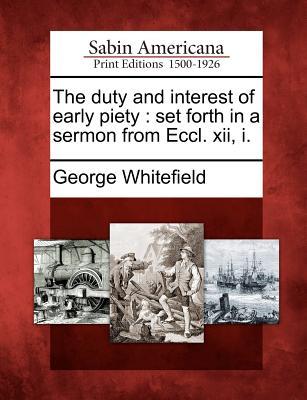The Duty and Interest of Early Piety: Set Forth in a Sermon from Eccl. XII, I. (11 of 59)
by George Whitefield
Title: The duty and interest of early piety: set forth in a sermon from Eccl. xii, i.Author: George WhitefieldPublisher: Gale, Sabin Americana Description: Based on Joseph Sabin's famed bibliography, Bibliotheca Americana, Sabin Americana, 1500--1926 contains a collection of books, pamphlets, serials and other works about the Americas, from the time of their discovery to the early 1900s. Sabin Americana is rich in original accounts of discovery and exploration, pioneering and westward expansion, the U.S. Civil War and other military actions, Native Americans, slavery and abolition, religious history and more.Sabin Americana offers an up-close perspective on life in the western hemisphere, encompassing the arrival of the Europeans on the shores of North America in the late 15th century to the first decades of the 20th century. Covering a span of over 400 years in North, Central and South America as well as the Caribbean, this collection highlights the society, politics, religious beliefs, culture, contemporary opinions and momentous events of the time. It provides access to documents from an assortment of genres, sermons, political tracts, newspapers, books, pamphlets, maps, legislation, literature and more.Now for the first time, these high-quality digital scans of original works are available via print-on-demand, making them readily accessible to libraries, students, independent scholars, and readers of all ages.++++The below data was compiled from various identification fields in the bibliographic record of this title. This data is provided as an additional tool in helping to insure edition identification: ++++SourceLibrary: Huntington LibraryDocumentID: SABCP03730100CollectionID: CTRG01-B3128PublicationDate: 17390101SourceBibCitation: Selected Americana from Sabin's Dictionary of books relating to AmericaNotes: Collation: 15 p
BUY NOW
Paperback, 24 pages
Published February 22nd 2012 by Gale, Sabin Americana
© 2025 Bibleportal.com 版权所有.

George Whitefield (1714 - 1770)
Also known as George Whitfield, was an English Anglican preacher who helped spread the Great Awakening in Britain, and especially in the British North American colonies. He was one of the founders of Methodism and of the evangelical movement generally. He became perhaps the best-known preacher in Britain and America in the 18th century, and because he traveled through all of the American colonies and drew great crowds and media coverage, he was one of the most widely recognized public figures in colonial America.Whitefield was an astounding preacher from the beginning. Though he was slender in build, he stormed in the pulpit as if he were a giant. Within a year it was said that "his voice startled England like a trumpet blast." At a time when London had a population of less than 700,000, he could hold spellbound 20,000 people at a time at Moorfields and Kennington Common. For thirty-four years his preaching resounded throughout England and America. In his preaching ministry he crossed the Atlantic thirteen times and became known as the 'apostle of the British empire.' He was a firm Calvinist in his theology yet unrivaled as an aggressive evangelist. Though a clergyman of the Church of England, he cooperated with and had a profound impact on people and churches of many traditions, including Presbyterians, Congregationalists, and Baptists. Whitefield, along with the Wesleys, inspired the movement that became known as the Methodists. Whitefield preached more than 18,000 sermons in his lifetime, an average of 500 a year or ten a week. Many of them were given over and over again. Fewer than 90 have survived in any form.
George Whitefield also known as George Whitfield, was an Anglican itinerant minister who helped spread the Great Awakening in Great Britain and, especially, in the British North American colonies.
He was a very influential figure in the establishment of Methodism. He was famous for his preaching in America which was a significant part of an 18th century movement of Christian revivals, sometimes called "The Great Awakening."
While explicitly affirming God's sole agency in salvation, Whitefield would freely offer the Gospel, saying near the end of most of his published sermons something like: "Come poor, lost, undone sinner, come just as you are to Christ"
He died in the parsonage of Old South Presbyterian Church, Newburyport, Massachusetts on September 30, 1770. He was buried, according to his wishes, in a crypt under the pulpit of this church.
George Whitefield was born in Gloucester in 1714. At eighteen he entered Pembroke College, Oxford, and soon became a member of a religious group that included John Wesley and Charles Wesley. The group became became known as the Holy Club or the Oxford Methodists.
In 1735 John Wesley and Charles Wesley became missionaries in Georgia, America. Whitefield followed three years later and was appointed minister at Savannah. Whitefield and Wesley returned to England and settled in Bristol and gave sermons in the open-air. However, whereas Wesley built a Methodist Chapel in Bristol Whitefield decided to go back to Georgia where he made extensive preaching tours.
When he returned to England, the Countess of Huntington appointed him her chaplain and built and endowed many chapels for him. He made seven evangelistic visits to America and spent the rest of his life in preaching tours of Britain.
Whitefield made the last of his seven evangelistic visits to America in 1769. George Whitefield died near Boston in 1770.
... Show more